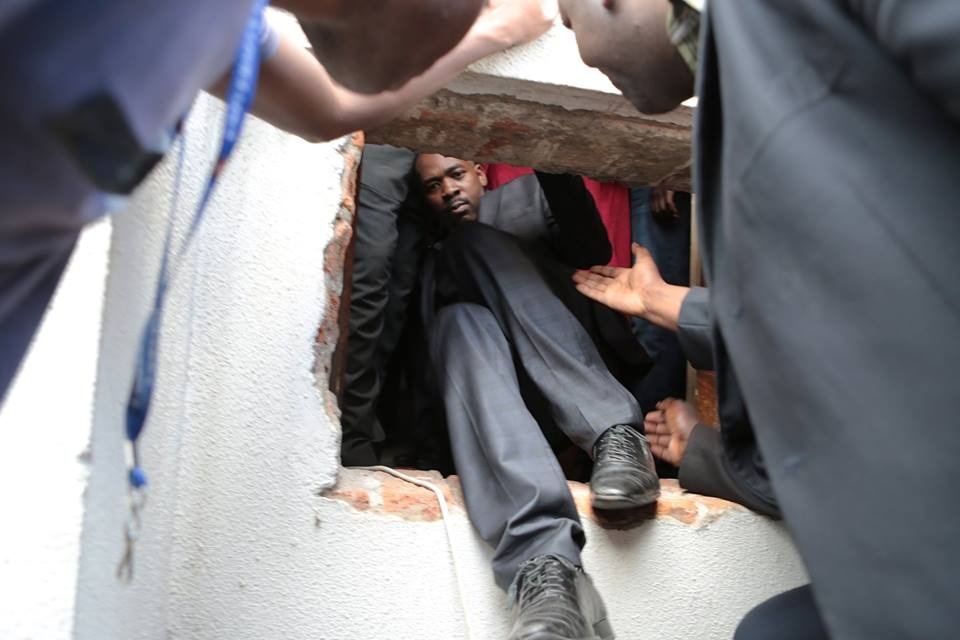by Prosperity Mzila
Leader of the Movement for Democratic Change Alliance (MDC A), Nelson Chamisa, huffed and puffed during his rallies, threatening to make Zimbabwe ungovernable, if the Zimbabwe Electoral Commission (ZEC), failed to pronounce him as the winner of the June 2018 harmonised elections. His exact words were “hakudyiwi rinopisa, ndozvidira mavhu, kana ZEC ikayita zvekutamba,” translated to say I will make this country ungovernable if ZEC fails to announce me as president elect.
Following his dismal loss to ZANU PF leader, President Emmerson Mnangagwa, Chamisa put his foot where his mouth is. His first attempt at making this country ungovernable was the August 1 chaos that got 6 people killed, leading Government to set up a Commission of Inquiry into the violent acts. His second attempt was when he took his petition to the Constitutional Court where he made himself a laughing stock by demanding that the panel of judges pronounce him as the presidential winner with no iota of evidence. After failing to sneak into the leadership of this country through deceitful means he has activated his third card, attack on the economy through alleging that Zimbabwe’s economy is on a downward spiral and he is the only one with the keys to make things happen.
In the same way his first and second attempts to make this country ungovernable failed, this third attempt is fast approaching its demise as people have proven it’s all false. In the past week there has been an upsurge in the amount of social media posts, on all social media platforms, purporting that the price of basic commodities has gone up. This should be dismissed with the contempt it deserves, because a survey that was carried out proved that the prices on social media were from as far back as 2010. This social media onslaught on the economy by the MDC Alliance is an attempt to create artificial shortages by triggering panic buying.
Recently, there has been a rise in cement prices due to people hoarding it for speculative reasons. The prices rose from US$12.50 for a 50kg bag of PPC cement to US$20 which is illogical and unjustifiable price increase. There is no justification as to why the price suddenly shot up to such a ridiculous price. It is therefore an issue that the law enforcement agencies should look into as people cannot continue to be robbed in daylight.
It has become clear that this is the work of the MDC Alliance and its external supporters who are sending false information about price hikes through Twitter, FaceBook, WhatsApp and Instagram. People should be aware of the amount of panic this can cause and refuse to be used to propagate falsehoods. Some citizens went to the shops while live on social media and took video footages to show the world and the people of Zimbabwe that claims of price hikes on basic commodities are false.
An assertion that the country’s economy is going on the decline should be dismissed with contempt, because they are meant to derail Government initiatives to revive the country’s economy. President E.D. Mnangagwa had extended a hand to regional, continental and international investors, to approach Zimbabwe for possible business opportunities, a gesture that has been widely welcomed. His recent visit to the People’s Republic of China brought him face to face with willing Chinese investors that are ready to come and invest in Zimbabwe. These opportunities will see the country reviving its economy, creating employment, improving infrastructure and service delivery.
In the next five years President Mnangagwa has declared that his focus will not be on politics but on reviving Zimbabwe’s economy to be an upper-middle class economy by 2030. And as soon as he swears in his cabinet, it will not be business as usual and every member of cabinet will be expected to deliver tangible results. President Mnangagwa’s zero tolerance to corruption has also created a conducive ground for investor confidence. All efforts to destabilise the country by Nelson Chamisa have hit a brick wall as President Mnangagwa is adamant that he will serve and protect the people of Zimbabwe, through implementation of policies that favour growth and development.




